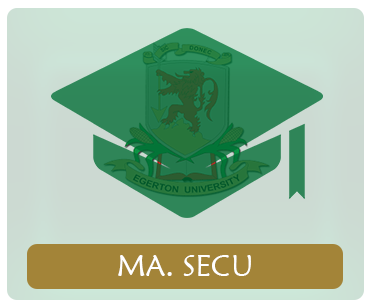Master of Arts in Criminology and Criminal Justice
-
UNITS
10
-
DURATION
2 Years
-
FEE
From: $1000/year
About the Program
Understanding crime remains a major concern of all societies in the world. Rapid change demands advanced skills in crime prevention and security management. These are requisite for stable social order and vibrant economic development. In presenting Master of Arts in Criminology and Criminal Justice, the department is meeting national needs in educating resource persons who are aspiring to take up leadership positions in the field of criminal justice system and in law enforcement agencies. This programme therefore offers the knowledge, skills and techniques required by a reformed criminal justice system and security sector. Crime has become a major impediment to development in most developing countries. Effective prevention, control and management of crime is essential in that it provides conducive environment for development. This programme therefore, intends to inculcate a thorough understanding of the fundamentals of contemporary skills, theoretical perspectives and policy issues within criminology and criminal justice. The programme also provides an opportunity for new entrants and those already working in criminal justice or related agencies. The programme therefore will benefit clients from; police service, criminal justice, correctional institutions, private security firms, consultancies, teaching and research.
Program Objectives
The aim of the course is to produce qualified personnel required for effective prevention, control and management of crime. It is also intended to enhance staff establishment in respective institutions and agencies. The main objectives of the programme are:
- To advance the undergraduate foundation in criminal and security studies in the realization of professional competencies;
- To equip graduates from various academic backgrounds with knowledge and skills required by the security organizations and governments;
- To produce scholars who are able to apply their knowledge and skills in security consultancies, teaching and research.
Program Learning Outcomes
The post graduates will be able to use acquired knowledge and skills to: :
- Analyse criminal and security issues in Society
- Provide required professionalism and skills in various security organizations and governments
- Provide consultancies, teaching and research in various organizations and governments.
- Undertake further studies.
- Develop relevant policies in criminology and criminal justice systems.
Admission Requirements
Egerton University admission rules shall apply; however, admission shall also be open to holders of a first degree in Arts, Social Science law or any other related disciplines, with at least second class honours (Upper Division) or an equivalent qualification from a recognized institution;
Applicants who meet the minimum admission requirements specified above may be required to appear for an interview by the department (either oral or written) to determine their eligibility.
How to Apply
- Apply online via the link given below the Program
- In the Registration portal, click apply and fill out your details in the fields
- Pay the Application fee of Kshs. 2,000 through Egerton University Account Number: KCB Bank A/C No. 1101906812
Fee
Fee Structure Annual charges for the programmes will be as follows:
Tuition Fee per Course Unit:
Undergraduate KES. 13,000.00
Administrative Costs Annually:
Undergraduate KES. 43,900.00
The breakdown of the administrative charges is given below
| Item | Frequency | Amount (Kshs) |
|---|---|---|
| Registration | Once | 2000 |
| Examination | Per Academic Year | 10000 |
| Material Development | Per Academic Year | 6000 |
| Library Fees | Per Academic Year | 5000 |
| Supervision Fee | Per Academic Year | 15000 |
| Student Union | Per Academic Year | 400 |
| CUE Charge | Per Academic Year | 1000 |
| Student ID | Once | 500 |
| Caution Money | Once | 4000 |
| Total | First Academic Year | 43900 |
The Annual Administrative fee for the 2nd year is less the Caution money and Student ID Charges (total, Kshs. 4,500) amounting to Kshs. 37,400
The fee summary is given below per academic year
| Academic Year | Administrative Fee | Number of Units | Total Tuition) | Total (Kshs) |
|---|---|---|---|---|
| Year 1 | 43900 | 10 units | 10*13000=130000 | 173900 |
| Year 2 | 37400 | 5 units | 5*13000=65000 | 102400 |
Note that the amount might be more depending on the number of units you take each session.
The fee is paid through the following bank account
KCB, Account no. 1101893680
Download a copy of the fee structure below
Program Coordinator

Mr. Samwel Auya
Lecturer : Department of Peace Security and Social Studies (PSSS)Phone #: +254 722 154 111
Email: lol@egerton.ac.ke


